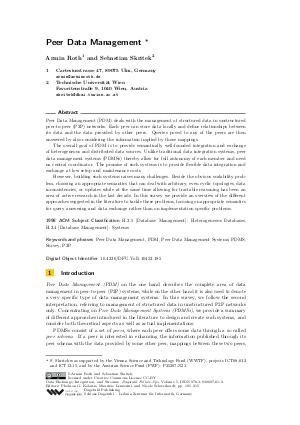Peer Data Management
Authors Armin Roth, Sebastian Skritek
-
Part of:
Volume:
Data Exchange, Integration, and Streams (DFU - Vol. 5)
Part of: Series: Dagstuhl Follow-Ups (DFU) - License:
 Creative Commons Attribution 3.0 Unported license
Creative Commons Attribution 3.0 Unported license
- Publication Date: 2013-10-18
File

PDF
DFU.Vol5.10452.185.pdf
- Filesize: 0.58 MB
- 31 pages
Document Identifiers
Subject Classification
Keywords
- Peer Data Management
- PDM
- Peer Data Management Systems
- PDMS
- Survey
- P2P
Metrics
- Access Statistics
-
Total Accesses (updated on a weekly basis)
0PDF Downloads0Metadata Views
Abstract
Peer Data Management (PDM) deals with the management of structured data in unstructured peer-to-peer (P2P) networks. Each peer can store data locally and define relationships between its data and the data provided by other peers. Queries posed to any of the peers are then answered by also considering the information implied by those mappings. The overall goal of PDM is to provide semantically well-founded integration and exchange of heterogeneous and distributed data sources. Unlike traditional data integration systems, peer data management systems (PDMSs) thereby allow for full autonomy of each member and need no central coordinator. The promise of such systems is to provide flexible data integration and exchange at low setup and maintenance costs. However, building such systems raises many challenges. Beside the obvious scalability problem, choosing an appropriate semantics that can deal with arbitrary, even cyclic topologies, data inconsistencies, or updates while at the same time allowing for tractable reasoning has been an area of active research in the last decade. In this survey we provide an overview of the different approaches suggested in the literature to tackle these problems, focusing on appropriate semantics for query answering and data exchange rather than on implementation specific problems.
Cite As Get BibTex
Armin Roth and Sebastian Skritek. Peer Data Management. In Data Exchange, Integration, and Streams. Dagstuhl Follow-Ups, Volume 5, pp. 185-215, Schloss Dagstuhl – Leibniz-Zentrum für Informatik (2013)
https://doi.org/10.4230/DFU.Vol5.10452.185
BibTex
@InCollection{roth_et_al:DFU.Vol5.10452.185,
author = {Roth, Armin and Skritek, Sebastian},
title = {{Peer Data Management}},
booktitle = {Data Exchange, Integration, and Streams},
pages = {185--215},
series = {Dagstuhl Follow-Ups},
ISBN = {978-3-939897-61-3},
ISSN = {1868-8977},
year = {2013},
volume = {5},
editor = {Kolaitis, Phokion G. and Lenzerini, Maurizio and Schweikardt, Nicole},
publisher = {Schloss Dagstuhl -- Leibniz-Zentrum f{\"u}r Informatik},
address = {Dagstuhl, Germany},
URL = {https://drops.dagstuhl.de/entities/document/10.4230/DFU.Vol5.10452.185},
URN = {urn:nbn:de:0030-drops-42949},
doi = {10.4230/DFU.Vol5.10452.185},
annote = {Keywords: Peer Data Management, PDM, Peer Data Management Systems, PDMS, Survey, P2P}
}
